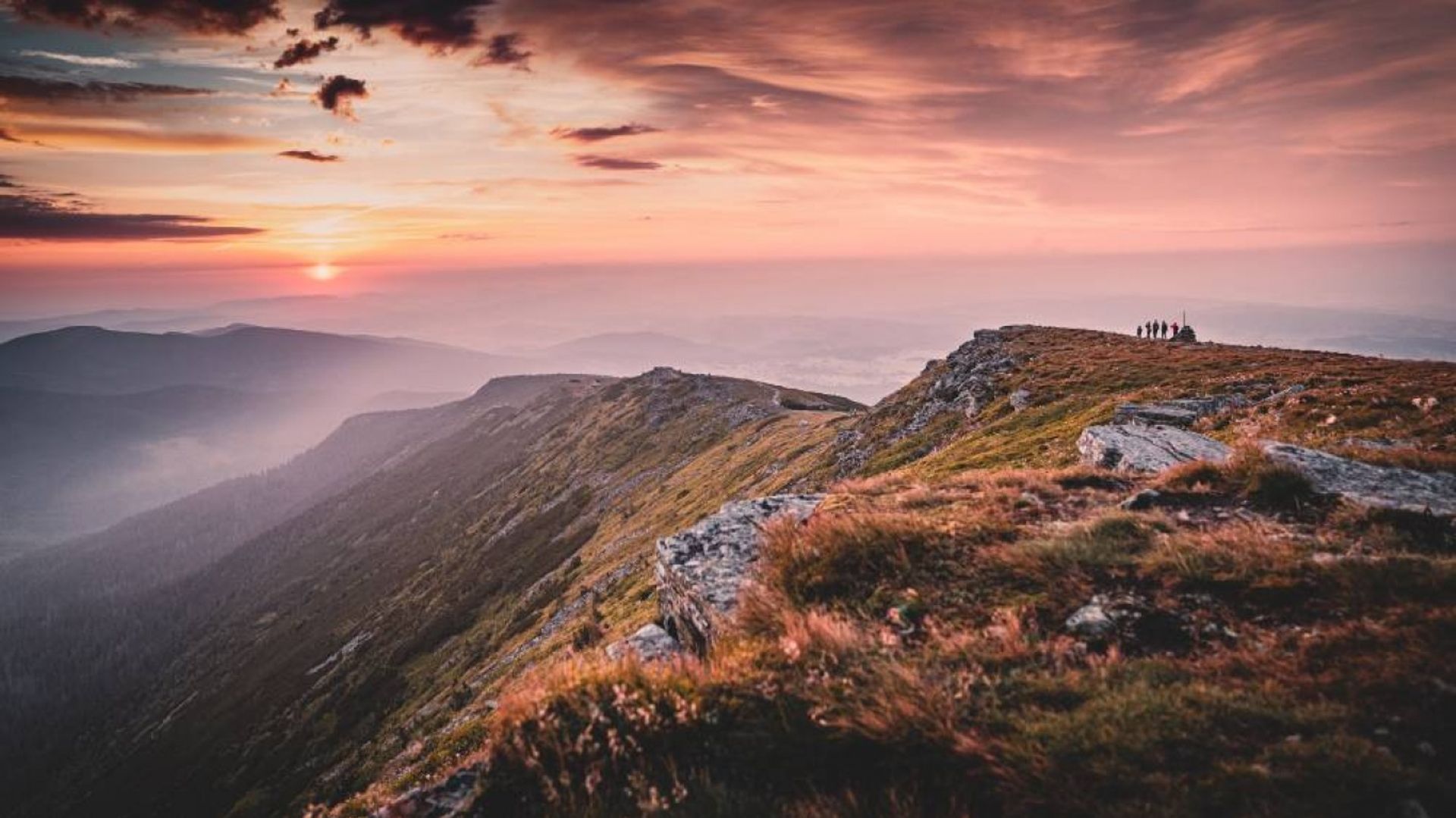
Śnieżnik Massif: attractions, interesting facts, trail descriptions. Explore the Eastern Sudetenland
The Śnieżnik Massif is one of the more fascinating mountain ranges located in the area of the Kłodzko Basin. Rising to a height of up to 1426 m above sea level, it is the highest part of the Eastern Sudetenland in Poland, delighting with beautiful views and great biodiversity. Discover the Snow Żnik Massif with us. The trails and attractions that are located there leave no room for boredom!
Sněžnik Massif — basic information
The Śnieżnik Massif is located between the Bystrzycskie Mountains and the Bialskie Mountains and has less than 300 km2 of area, of which there are about 200 km2 in Poland. First of all, its characteristic shape draws attention — 6 arms separated by deep valleys depart from the centrally located Śnieżnik (1426 m above sea level), which is the highest peak of the range. The highest of the ridges stretches towards the south-west. Within it there are, among others, Mały Śnieżnik (1326 m above sea level), Puchacz (1175 m above sea level) and Trójmorski Wierch (1145 m above sea level). These are the most frequently conquered peaks after Śnieżnik, which the Śnieżnik Massif has to propose. Routes leading to them are not the most difficult — relatively gentle and at the same time not very demanding approaches make them suitable also for people with average physical condition or wandering together with children.
In turn, the most branched ridge of the Śnieżnik Massif is located in the direction of Kłodzko. Within it there are such peaks as Smrekowiec (1123 m above sea level), Igliczna (845 m above sea level), or Czarna Góra (1205 m above sea level). Next to these two, one can also distinguish a ridge ending at the Płoszczyna Pass, which separates the Śnieżnik Massif from the Bialskie Mountains, a ridge with a climax in Stromej (1166 m above sea level) and another with a climax in Średniak (1210 m above sea level). The last of them is located entirely within the Czech Republic and includes, among others, the elevations of Sušina (1321 m above sea level) and Podbělka (1307 m above sea level).
You can read about other mountain ranges surrounding the Kłodzko Basin here: Mountains and peaks around the Kłodzko Basin. Tourist guide
What to visit in the Snow Żnik Massif?
In the case of the Sněžnik Massif, hiking trails are just one of many attractions. What else is worth seeing within it?
- Bear's Cave
The Bear Cave is one of the most important attractions that the Śnieżnik Massif has to offer — a map of the region without this place would lose a lot. It is located near the village of Kletno and is the longest cave in the entire Sudetenland — its corridors are about 4.5 km and stretch over 3 levels. The bones of many prehistoric animals were found in it, including a cave lion, a cave hyena, or a cave bear, which was the most widely represented species among the remains.
- Uranium Mine in Kletony
The mine is located in the northern slope of Żmijowiec and is a part of the history of mining, which also included the Śnieżnik Massif. The attractions of this place are not limited only to underground corridors — they are also minerals that form part of the walls, or a special “luminous” exhibition.
- The Museum of the Earth in Kletno
Another interesting object in Klata is the Museum of the Earth with unique fossils and minerals. There you can admire, among others, nests with dinosaur eggs, traces of their paws found in the Table Mountains, or traces of other mammalian reptiles from 250 million years ago. The Jurassic park with 1:1 scale models was also available to visitors.
See what else to do in the area: Sowie Mountains — attractions and the most beautiful trails. What is worth seeing here?
Śnieżnik Massif — accommodation
If you want to see the Śnieżnik Massif, you can plan your accommodation not only in the immediate area — thanks to the well-developed road network, you can easily reach its surroundings not only from anywhere in the Kłodzko Valley, but also from the entire Kłodzko land.
Vital & SPA Resort Szarotka is a high-quality accommodation facility located in Zieleniec, at the foot of the Orlické Mountains. It offers not only favorable, tailored accommodation conditions, but also a number of amenities — SPA salons, a swimming pool complex and attractions for children. Moreover, located in a well-connected area, it allows free access to many places in Poland and the Czech Republic. So if you are looking for a real rest, book your stay in our resort now!
Is it difficult to climb to Sněžnik?
Due to the relief of the terrain, which stands out for the Śnieżnik Massif, the hiking trails leading to the summit are distinguished by varying degrees of difficulty. Thanks to this, anyone who wants to get a Snow White can choose a route tailored to their capabilities.
How long does it take to get to Snownik?
As the trails passing through Śnieżnik take different routes and from different directions, it takes 2.5 to 5 hours to climb to the summit. However, it is the expected time and, depending on weather conditions, conditioning preparation and the number of breaks, it can be longer or shorter respectively.
Where is it closest to Sněžnik?
One of the gentlest and shortest routes to Śnieżnik leads along the red trail from the village of Międzygórze to the PTTK Hostel “Na Śnieżniku”, and further blue and green to its very top. From the Branch of the PTTK named after M. Orłowicz, it has about 8 km long and a total of 838 m approaches. It should take approximately 3.5 hours to overcome it. However, it can be further shortened by starting a trip in Międzygórze Górne.
In the case of these mountains, however, it is worth paying attention to other, alternative hiking trails. The Snow White Massif is crossed by their dense web, and depending on which ridge they cover, they can vary in both length, and degree of difficulty.
How long do you get to Snow Żnik via the most popular routes?
- Śnieżnik from Międzygórze — leaving from Międzygórze, you can choose a longer route, starting under the previously mentioned PTTK division, or shorter — from the parking lot on the edge of the village. It leads along the red trail until the Shelter on Śnieżnik. On this section it overlaps partly with the Black Road delineated along the Black Creek. Then, to reach the top, you need to walk a piece of blue along the trail and at the intersection with the green one, go just it. The shorter route to Sněžnik is 5.8 km and should take about 2 hours and 40 minutes.
- Śnieżnik from Czarna Góra — in this case the route starts at Puchaczówka Pass and leads through Czarna Góra (1205 m above sea level), Pass under Jaworowa Kopa (1132 m above sea level), Żmijowiec (1153 m above sea level) and Shelter na Śnieżnik, all the way to the very top. You go to the shelter along the red trail, then again, as before, blue and yellow. The entire distance to cover is about 9.5 km, the estimated time is again about 3.5 hours.
- Śnieżnik from Kletno — the route leads from the village of Kletno and leads along the yellow trail to the Shelter pod Śnieżnik, further green again to the top of Śnieżnik. The surpass here is about 800 meters, while on the way you can stop and visit, among others, the Bear Cave, which is considered one of the most beautiful in Poland. The entire route is about 5.5 km, and it takes about 3.5 hours to complete it.
- Śnieżnik from the Płoszczyna Pass — the beginning of the route is at the Płoszczyna Pass, which is the border point between Poland and the Czech Republic. The whole one goes along the border and leads along the green trail to the very top of Śnieżnik. Where to park after reaching the pass? There is free public parking. In turn, thanks to the low popularity of the trail, it is easy to find a place for a car there. The Płoszczyna — Śnieżnik Pass route takes about 3 hours 15 minutes and is about 8.6 km long.
Is it difficult to climb to Sněžnik?
The difficulty level of exit to the top depends on the chosen trail. Due to the mountains in which Śnieżnik lies and how many peaks there are in its massif, it has a lot to propose. Thanks to the variety of routes, it is easy to find the optimal one in terms of length, surpass, sum of approaches, or sums to eat. Moreover, the shelter located below the peak of Sněžnik makes it possible to spread your expedition over 2 days. However, this facility offers not only accommodation and catering facilities, but also hiking equipment and cross-country skis rental.
Where is the best way to go to Snownik?
When deciding which trail will be the best and how to enter Śnieżnik, it is worth considering above all the atmospheric factors and the nature of the route itself. The conditions on the route can strongly thwart plans, especially in winter or early spring, when snow often makes it difficult or even completely impossible to hike. However, while the weather is favorable, even during this unpopular time of year for hiking, you can go to Sněžnik. What is worth seeing during such an expedition? Notable, above all, are the breathtaking views, which consist of snow-sprinkled forests and glades. Usually there is also a lookout tower.
What can you see from Snownik? In good weather, you can see from there the Giant Mountains along with Śnieżka, Mount Ślęża and the lakes Otmuchowskie and Nyskie, Zieleniec, the Bystrzyckie and Orlickie Mountains, the range with Mały Śnieżnik and the Trimorski Wierch, as well as the Polish Silesian Side and the Czech town of Jeseník.
Where to get to Sněžnik the fastest way?
It takes at least 2.5 — 3 hours to enter Sněžnik, although people who are seasoned in mountain hikes will probably cope with reaching the summit in less time. One of the fastest routes is the one leading from Kletna. After parking your car in the Bear Cave area, you can climb to the top even in 2-2.5 hours.
Another fast route leads from Międzygórze. Parking in Międzygórze Górny, at the end of the village, after about 2.5 hours you can walk to the peak of Śnieżniki. How to get to this town? The most convenient access is via local roads through Domaszków or Wilkanów. In turn, thanks to the preferential location, you can reach there from many corners of the Kłodzko Basin, also from Dusznik-Zdrij. This again makes it unnecessary to wonder — planning to go to Sněžnik — where to stay overnight in the area.
Special Offers

Book your stay in Zieleniec
up to 25% discount on ski passes
the best price directly in the property
the best rooms within accessibility
473 km/4.5h
407 km/4.4h
101 km/2h
321 km/3.4h
121 km/2h
300 km/3.3h
453 km/4.4h
